Talk to most entrepreneurs about why they put in the long hours on their endeavors, and they’ll tell you it’s all in aid of building a better life.
They’re busy putting in the hard yards now so that in the weeks, months, and years to come, they’ll be able to relax.
However, building for the long term is no easy task. It can be hard to stay motivated, it can be hard to develop your skill set, and it can be especially hard to walk a different path to all your peers.
But for those who stick with it, the rewards can be huge.
Two people who know just what can happen when you put your mind to it are married dropshippers, Shishir and Namrata. Throughout 2019, the Vancouver couple’s general store has gone from after-work side hustle to something that has made them over $800,000 in sales. And they’ve done it all while working full-time.
But it didn’t happen overnight.
Not all that long ago, the two were dreaming of creating something that might one day allow them to live what Namrata called “a real quality life.”
What followed was a lot of research, patience, and learning, before finally, a lot of success.
Eager to share more about their experience, Shishir and Namrata took a midnight skype call to speak with me about their journey and what they’ve achieved. They also shared some fantastic, actionable advice for other dropshippers looking to replicate the financial freedom they’ve attained.
Post Contents

Don’t wait for someone else to do it. Hire yourself and start calling the shots.
Get Started FreeAn Opportunity Turns into Discovery

While some entrepreneurs start a business out of desire, for Shishir and Namrata, it was almost a necessity.
“I would say I was very obsessed with online shopping,” says Namrata, as her husband laughs in the background.
“When we bought our place, I started buying a lot of stuff to the point where we couldn’t really furnish anymore. And that’s when my husband realized that I had good taste in doing up the place, and he said that we can actually even start a home decor store.”
With Shishir seeing the potential of Namrata’s shopping addiction – and eager to stop their home becoming too overcrowded – he started investigating the possibility of starting an ecommerce business.
Starting with his home decor idea, Shishir began researching and stumbled across the dropshipping business model. Being so low risk – and Shishir works in portfolio management, so he knows a thing or two about risk – they were curious to give it a go and see what returns they could get.
Perseverance Pays Off
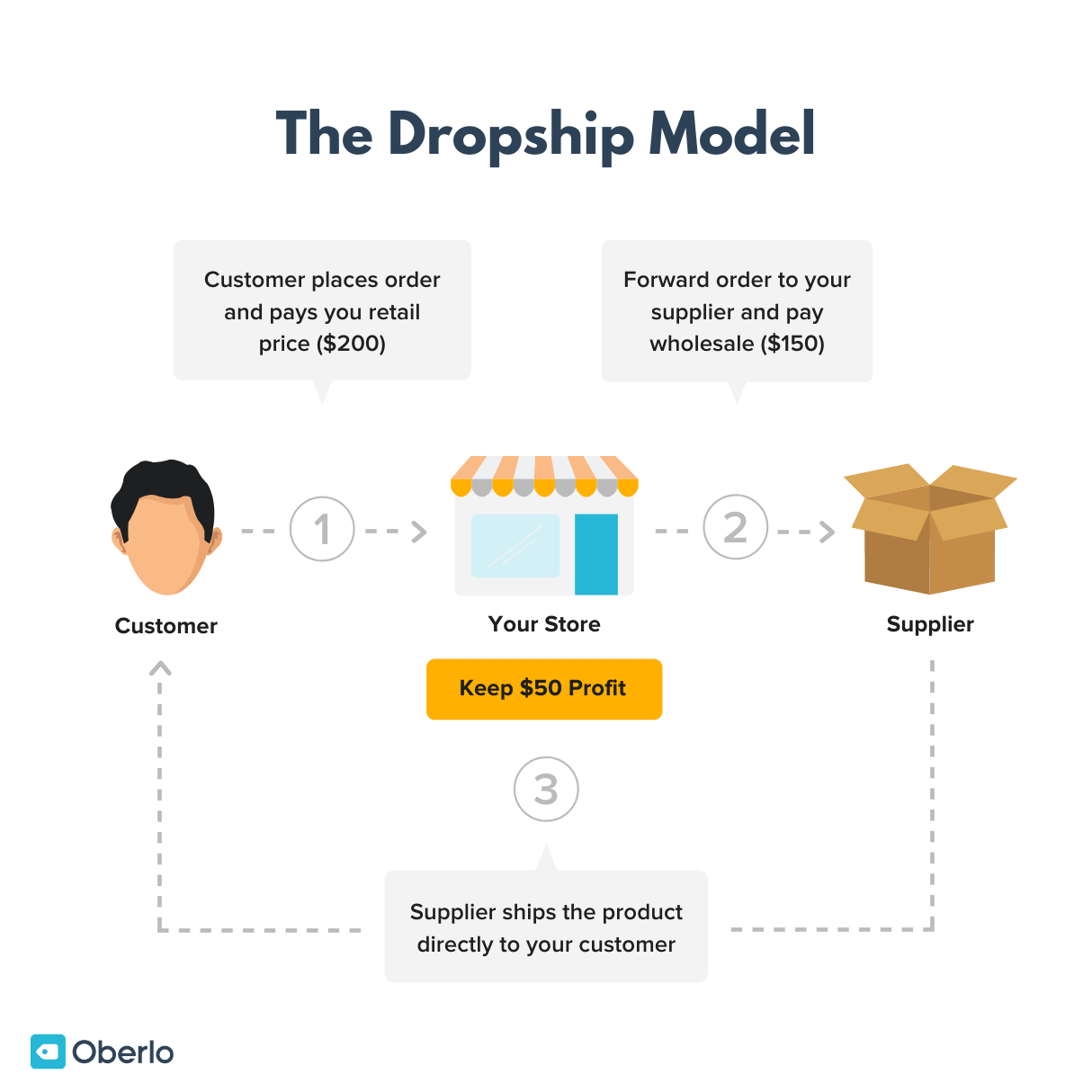
After some initial experimenting, Shishir and Namrata discovered that problem-solving products were good items to sell as they answered a need. And after setting an online general store of problem-solving products using Oberlo and Shopify, the race was on to find a winning product.
But before they could run, Shishir and Namrata needed to learn how to walk.
“We had quite a lot of hits and misses. We were trying lots and lots of products off the shelf, and we had no clue how to advertise them.”
Undeterred and learning all the time, Shishir and Namrata persevered, and after testing somewhere between 20-30 products, they eventually found a winning one.
“Around April-May of 2019 is when we sort of first hit our first few products that caught on. And then the next phase of hurdles was, ‘OK, so how do you scale something like this?’”
Always Researching, Always Improving
Despite being keen to scale, Shishir and Namrata struggled with Facebook ads, and scaling their store started to seem near impossible. But again, this is where the couple’s patience and research paid off.
“We had been struggling for several months,” says Namrata. “But then we had been constantly reading up materials, checking YouTube – a lot of research eventually paid off.”
“It’s a matter of really being diligent and patient about it,” adds Shishir.
By continually building their knowledge (“whatever there is to learn, these days you can learn on YouTube”), the couple soon figured how to scale, and by June 2019, they were making $50,000 a month with their first winning product.
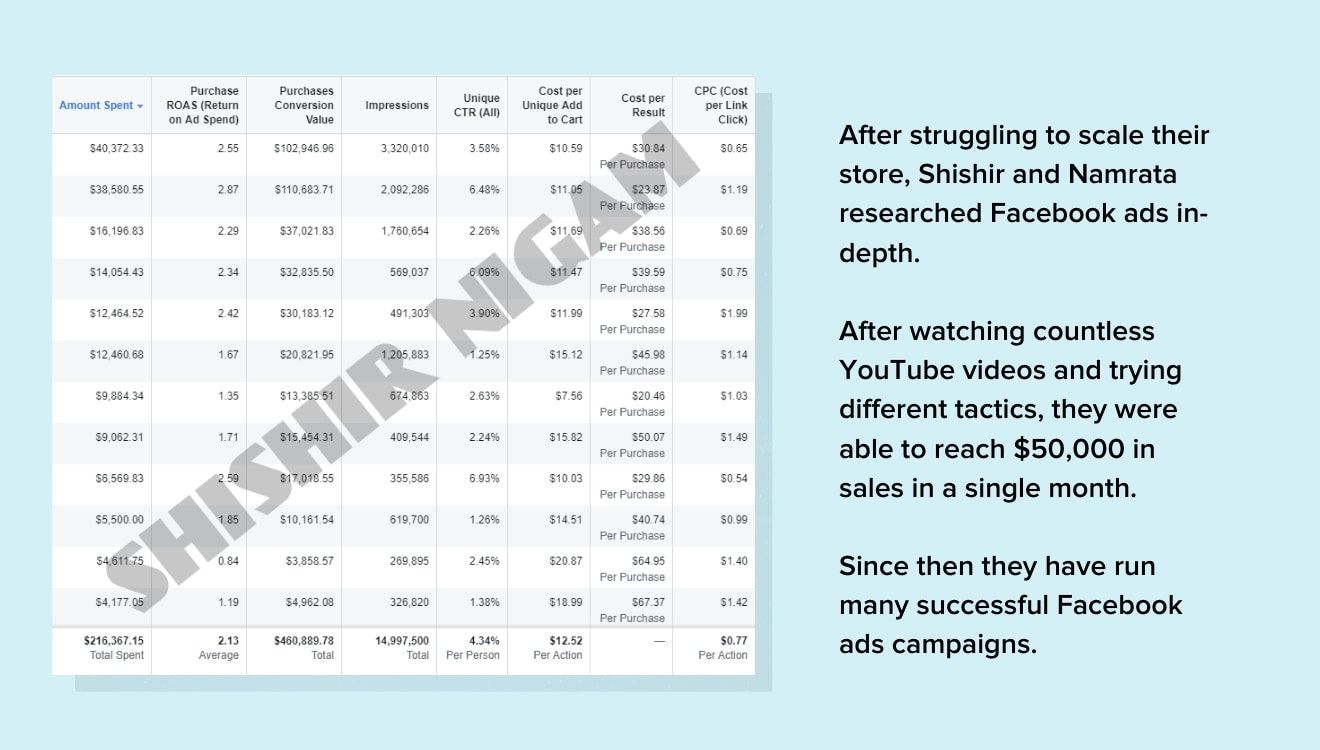
But, even though their product was a winner, the couple were acutely aware that other dropshippers could also start selling it and quickly cut them out of the market. In addition to continuing to find more winning products, they also needed a point of difference, and they realized they could do this by offering exemplary customer service.
“I think customer service is the one differentiator that nobody can beat you at,” says Namrata. “In dropshipping, everybody can copy your product, but the customer service is what really can set you apart. So that is the one thing that we’ve focused on from day one.”
Doing things like replying to customers quickly, offering refunds, and being upfront about longer shipping times all helped Shishir and Namrata build trust with visitors. By providing excellent customer service, they were able to maintain a high customer feedback score on Facebook, which kept their ads from being penalized. It also resulted in a reasonable customer return rate – giving the couple revenue even when they weren’t running ads.
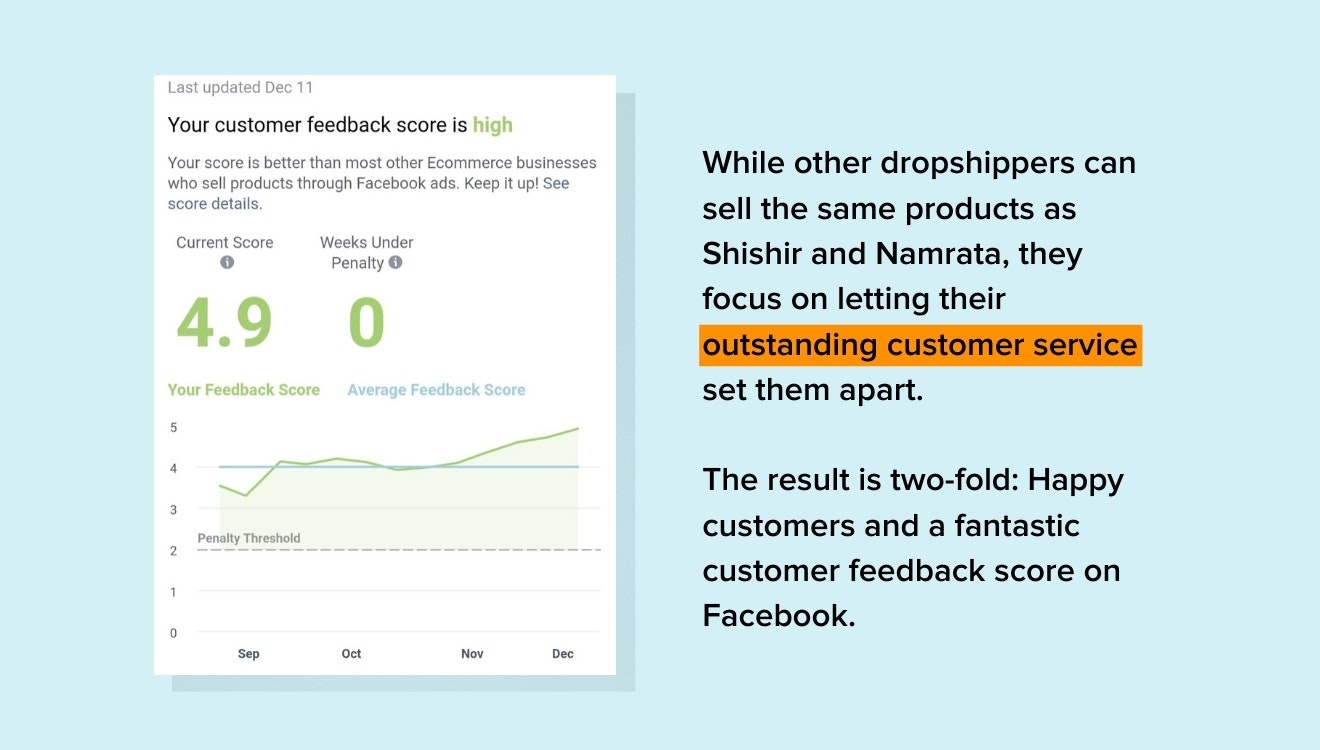
The Big Pay Off
As well as building trust with their customers, Shishir and Namrata focussed on finding more winning products and making sure their initial success wasn’t a fluke.
They continued to learn from what they found online, as well as what they noticed in their own Facebook ads formula, then used that information to set up systems that made sure everything became replicable.
The couple also started working with an agent in China to ensure they always had enough stock for customers. They also started working on how they could increase their average order value to get the most they could from every single customer who visited their store.
Over time it all started adding up.
In the last few months of 2019, everything started coming together, and the results were astounding. In November alone, they did more than $244,000 in sales, and by December 31, their yearly sales total was more than $813,000.
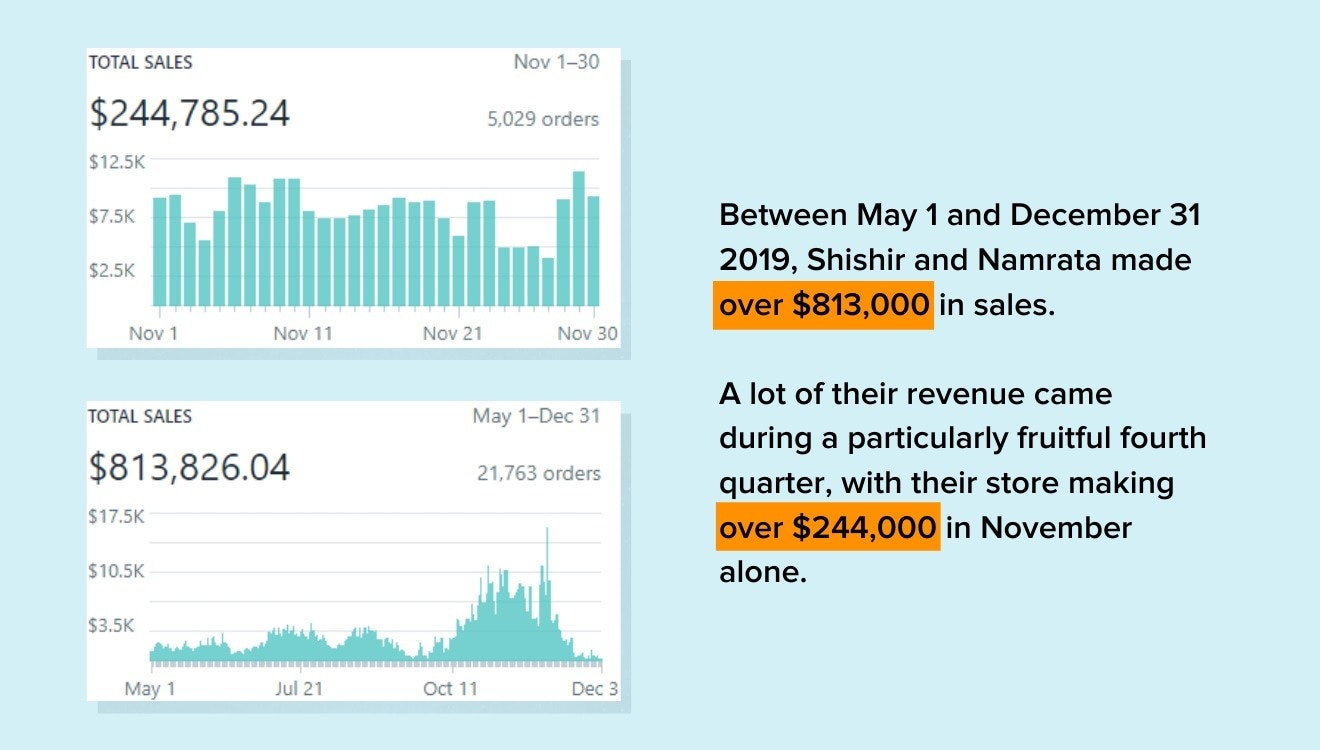
After experiencing the highs and lows of ecommerce, these days, Shishir and Namrata are more confident than ever that their store will be able to help them reach their dream of living a quality life. They’re still currently working full-time jobs, but with their patient approach, it’s only a matter of time before ecommerce becomes the main form of income.
Meanwhile, this year Shishir and Namrata have a new goal to work on – helping others achieve success. Having worked through so many obstacles and implemented systems to keep their business sustainable, the pair now want to teach others how to do the same on their YouTube channel, Journey2Freedom. They’re excited about helping people learn from their mistakes and triumphs to gain financial freedom as well.
But before you dive into Shishir and Namrata’s YouTube channel, they told me some of their biggest tips for dropshippers wanting to get their store to the next level.
1. Newbies Listen Up: Patience is Key
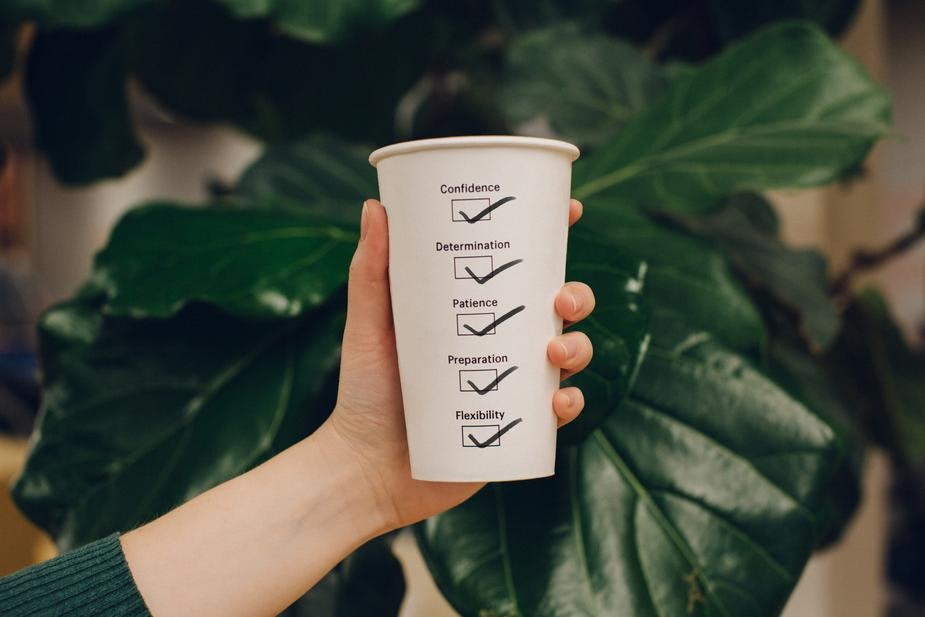
Shishir and Namrata started their store with the hope they could eventually quit their full-time jobs and spend a significant portion of the year enjoying life, without worrying about work.
With such big dreams, they needed to stay motivated and patient – especially through the difficult first months of testing products, adjusting ads, and spending money without seeing significant returns. It’s something Shishir believes dropshipping newcomers should bear in mind.
“In the beginning, when you’re still looking for products, the number one thing would just be patience – having enough patience to test the products.”
Although it could seem torturous to spend cash testing product after product with minimal returns, the couple looked at it as an investment. The way they saw it, not only were they finding a winning product, but they were also gaining valuable knowledge on how to run a successful store.
Altogether Shishir and Namrata think they tested around 20 to 30 products, spending about $50 to $100 per product to determine if it was a winner or not. Although this might seem like a lot, it was money well spent for the couple who were able to recoup those costs – and much more – when they found their first winning product.
2. Learn From Yourself – and Others – to Get Ahead of Problems

Another major part of Shishir and Namrata’s journey has been continually learning and growing from their mistakes. This mindset is what allowed them to slowly build their revenue to the point where they made $244,0000 – or 30 percent of their total 2019 sales – in November alone.
Sometimes these mistakes were as simple as an ad linking to the wrong page, or a spelling mistake going unnoticed for ten days. Other times it was slightly more complicated, like figuring out that a successful ad was resulting in low sales because the website load time was slow.
It can be frustrating to acknowledge when something has gone wrong, but Shishir and Namrata prefer to consider each mistake a valuable lesson that will ultimately help them succeed.
“If you’re not having accidents, then it just seems too good to be true, right?” says Shishir. “You have to learn from something. I don’t think you would learn as much if you wouldn’t have to overcome all of those.”
And aside from just learning from their own dropshipping failures, Shishir and Namrata were also careful to avoid problems that make people quit dropshipping.
Most dropshippers know that PayPal can make things difficult for store owners by suddenly imposing limitations on accounts. Knowing that this was a common problem, Shishir decided to add tracking numbers to every PayPal order, ensuring full transparency about his business. And when PayPal finally came knocking – right in the middle of a busy fourth quarter – there was minimal disruption.
“I was mentally prepared for it, so right away when it happened, immediately, I went to PayPal to say, “Hey, can you increase our limit?” And I think because PayPal saw that right from day one, I’ve been uploading each and every one one of my tracking numbers as proof of shipping, they accepted my request for the increase right away. And they bumped up that limit to like four times my current monthly volume – so hopefully, I won’t have limits for a while.”
3. Don’t Rely on Luck to Operate, Develop Systems Instead
It took Shishir and Namrata a lot of time, energy, and money to find their first winning product. And while they were happy to have found it, they wanted to make sure their business was sustainable – they needed to find more winning products.
So, Shishir started building systems to ensure he didn’t have to rely on luck to do so.
Using what he’d learned during their initial testing phase, Shishir created a four-stage troubleshooting process for finding winning products. The system starts with product choice before moving through to finding your target audience, checking ad effectiveness, and website conversion – only after all of this is it time to scale and start selling high volumes.
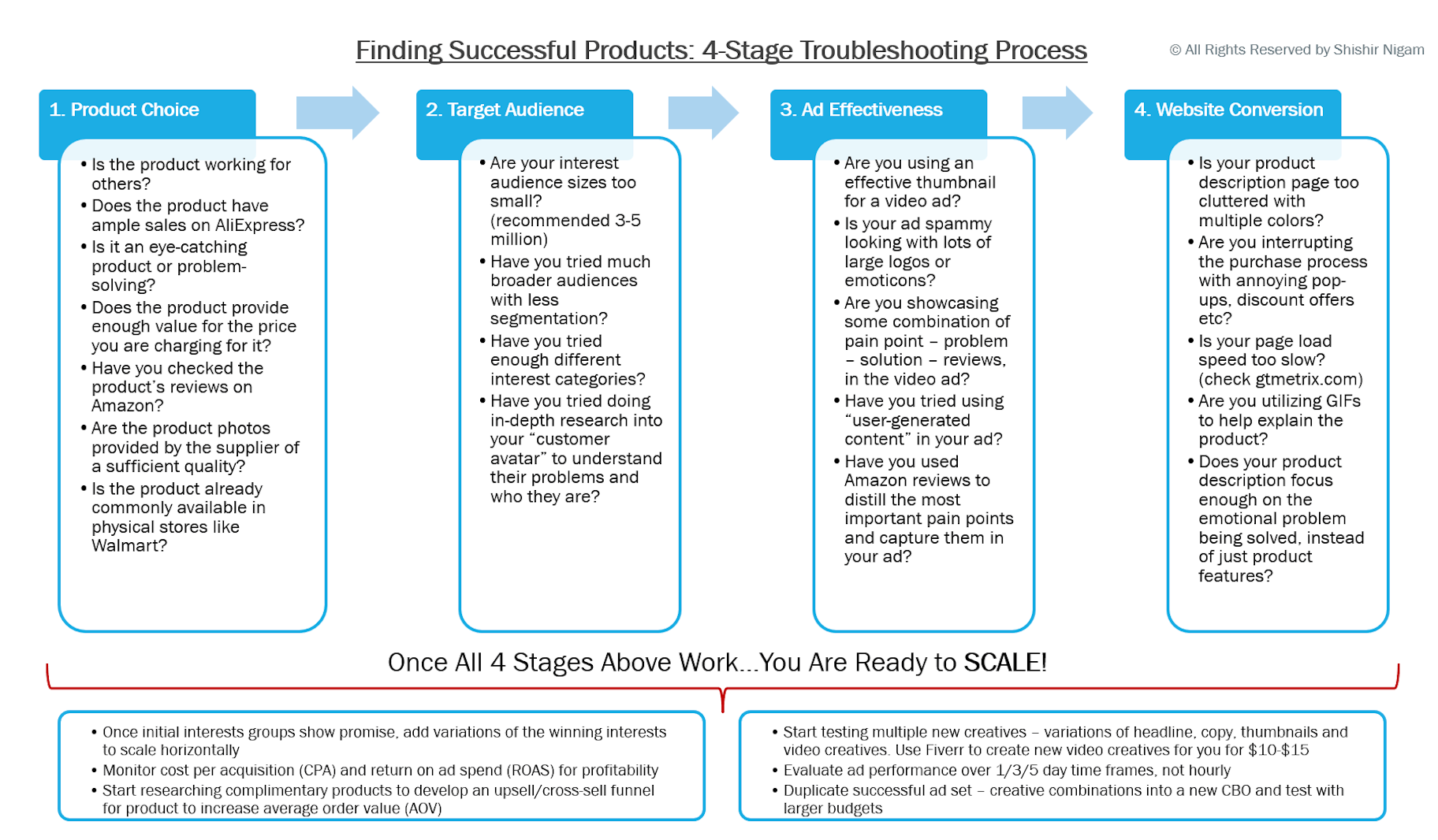
But finding winning products wasn’t the only aspect of business that Shishir developed a system for, he also developed them for ad scaling strategy and customer service. And, having these in place meant it was easy to delegate tasks when the store grew so popular that they took on the help of a virtual assistant.
All in all, the systems have allowed Shishir to grow the business for the long-term, and he thinks other dropshippers should do the same.
“For the people who have had several winning products, my only suggestion would be to start creating systems that can make the business sustainable. Because then you are able to delegate that system to somebody else and you can hire. Because ultimately, what I’ve realized is, the long-term sustainability of this business is only because of systems being put in place. Otherwise, you’re always hoping for the one product, and once it goes away after three months, you’re back to square one.”
4. Upsell – But be Strategic About It
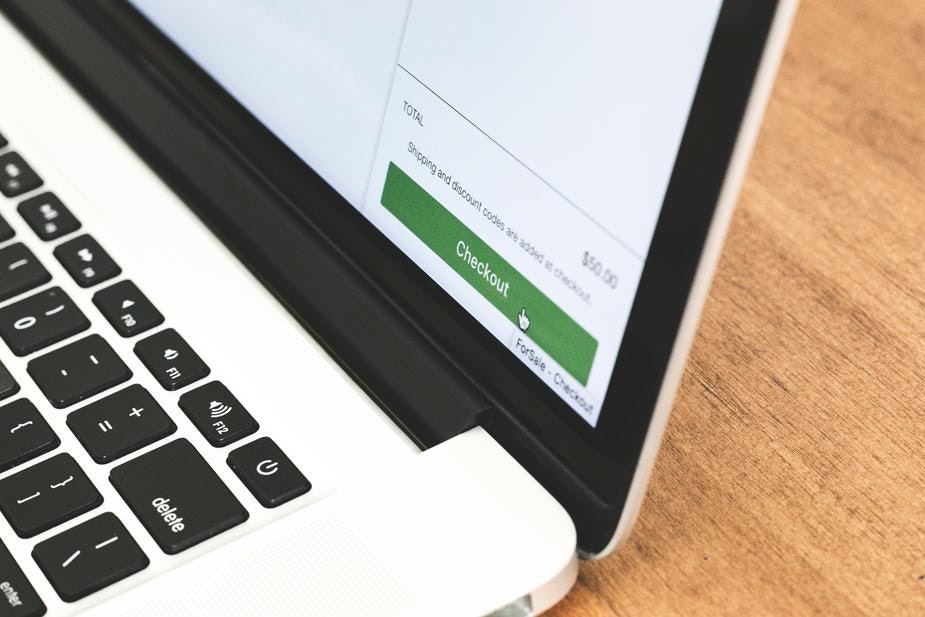
While a lot of these tips have been about mindset, this is one easy-to-implement thing that could generate your store mega cash.
The use of pop-ups and upselling apps is something that divides online store owners. Some love them, believing they’re the key to driving customers to the checkout and increasing average order value. Meanwhile, others argue they disrupt a customer’s shopping experience and can even cheapen a store.
Shishir and Namrata fall somewhere in the middle of these arguments.
They’re not fans of using in-your-face pop-ups or spin-to-win wheels for fear they’ll ruin the shopping experience, but once the customer has purchased, it’s a different story.
After experimenting with different upsell apps in the first half of 2019, Shishir and Namrata found success with OneClickUpsell. Rather than interrupting a customer, the app comes into play after buyers have purchased. Immediately after a customer buys something, the app diverts them to an upsell offer. Customers can either accept the offer with a single click or refuse it before being rerouted to a thank you page.
It’s a tactic they’ve found extremely fruitful.
“Zipify alone in 2019 generated an extra $100,000 in revenue – essentially that’s my entire profit. That one aspect is what really makes a big difference that I think a lot of people don’t focus on. They focus very much on the upfront offer, which is fine, you need to have that, but once you have an upfront offer, you need to figure out the upsells and increase that average order value.”
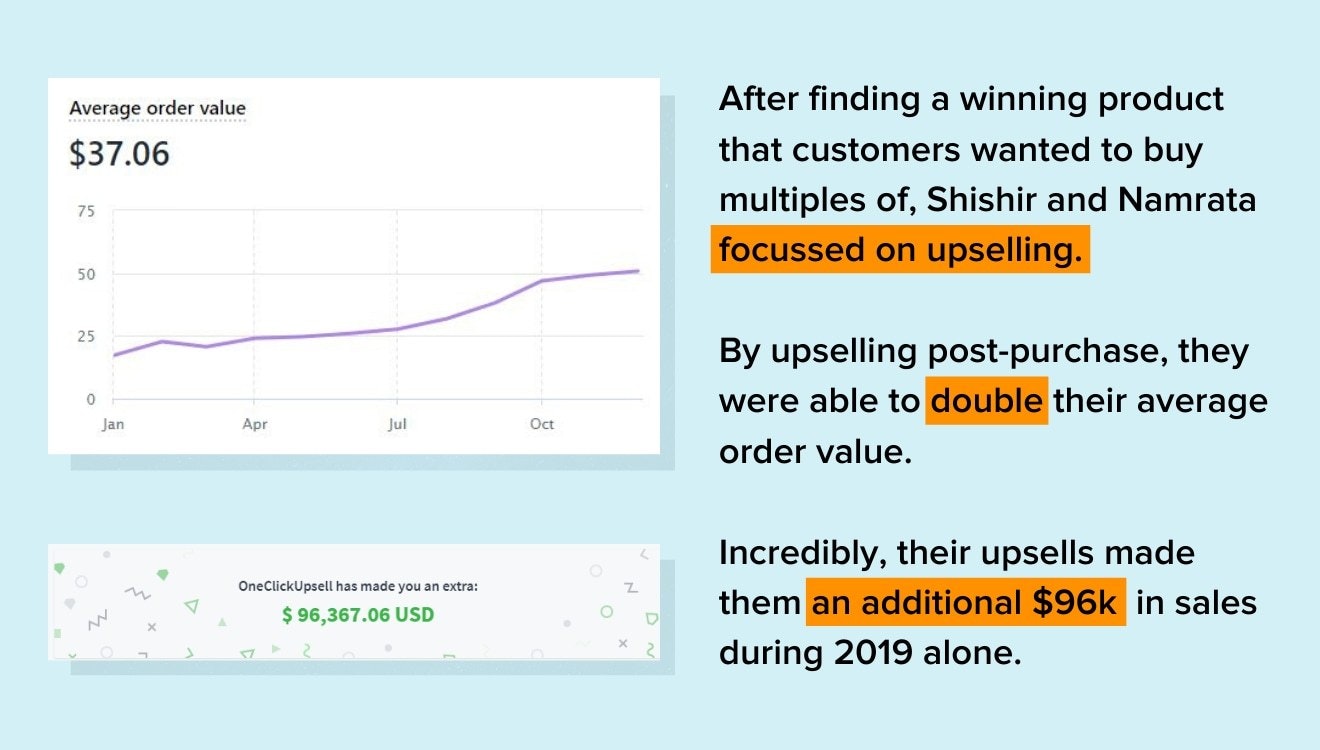
By making an additional offer to customers who have already committed to spending money, the likelihood of that person spending more is higher – their resistance is low.
It’s the online store equivalent to displaying candy bars and magazines at the checkout – you’re already buying a trolley load of food, what’s one more thing in the scheme of things? It’s a small amount to the customer, but it could make a massive difference to your overall profit.

